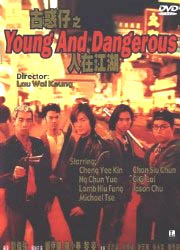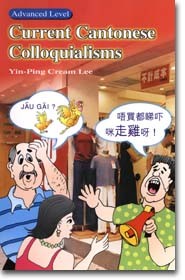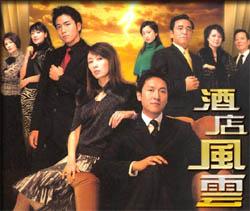I am quite often asked by people why I love Cantonese so much. I grew up in a small city called Canberra and studied at the Australian National University. Prior to entering University I knew nothing about Chinese people. I remember how much I hated seeing Chinese people not speaking English in public thinking how disrespectful it was to our Australian culture. 
My first contact with Chinese people occurred at University when living at Burton and Garran Hall, which is a dormitory housing many local and overseas students. For several Finance and Marketing subjects, I recall being randomly placed into a team group to complete an assignment and I was quite disgruntled when Mandarin was the primary language of communication of our group. I had no idea what my team members were talking about and I felt quite excluded. They always talked in Mandarin and translated for me in English; it would have been easier to just use English as it took double the time to say the same thing.
Throughout my University life, I met many Cantonese and Mandarin speakers. I remember many miserable moments when being invited to group dinners. On these occasions I felt excluded, bored and upset. I knew everyone could speak English but they chose to talk in Chinese. All I could understand was my name mentioned every so often; I spent the night looking at their faces trying to figure out if they were making fun of me. Some people even tried to make me the night’s entertainment by asking me to repeat some words (eg. ni hao) and laughed at my poor accent. From this incident, I concluded non-Chinese will never have the ability to speak Chinese.
Prior to December 2005 I couldn’t care less about speaking Chinese. Then in December 2005, I became quite interested in learning Mandarin. I thought of the future importance and usefulness it will have if I one day decided to work in China. I employed a private Mandarin tutor as my wife is not a native Mandarin speaker, and so started studying. If I’m going to learn Mandarin properly, I sure didn’t want to hear my wife’s heavy Cantonese accent. My wife from Hong Kong told me her family will visit us at the end of January 2006, and I knew her entire family could only speak Cantonese. I started thinking how impressed they would be if I could say a few basic sentences and answer some simple YES/NO questions. So I started listening to the Pimsleur Cantonese course and practiced speaking some basic sentences with my wife. I asked her to speak 100% Cantonese to me, but proved to be an ineffective method; I simply couldn’t understand a thing. After completing the Pimsleur course, I still struggled to string 2 useful sentences together when my wife’s family arrived. I felt discouraged and depressed, so I searched the Internet for Cantonese learning resources. I came across an excellent Cantonese beginner’s site http://chinese-lessons.com/ teaching an array of vocabulary and grammar. It took me 1 week to read all the grammar explanations and listen to each audio WAV file 50-100 times. I learnt more in 1 week than in 1 month of Pimsleur.
In March, my Mandarin teacher from Hangzhou mentioned to me that she had started learning Cantonese. She told me there was a Cantonese beginner’s course at the Meadowbank’s TAFE in Sydney. I started class 5 weeks late and stopped going at week 9. I was so disgusted that on the 9th week, students were still learning how to make a basic sentence. I discovered a massive Cantonese knowledgebase and asked my wife to teach me more and more from online resources. Around April-June, I attended an Advanced Level Cantonese course in the city, which turned out to be a beginner’s level. How could people with 1000 word vocabularies consider themselves Advanced? The students couldn’t even string a sentence together or answer any question without English. I went to Hong Kong in June spending ~2 weeks speaking 80% Cantonese; I surprisingly improved more in 2 weeks then in 6 months.
I came to realize how critical Cantonese is to survive in non-tourist or expatriate suburbs. I returned to Australia and discovered Steve Kaufmann, a linguist who mastered 9 languages adopting his language study approach. I quit wasting my time on Mandarin and asked my wife to make hundreds of 2-3 minute MP3 dialogues. I studied everyday; before work, on the train, walking to work, during work, and after work. I became obsessed with Cantonese, studying for a minimum of 10 hours per day and weekends even longer. My vocabulary and fluency improved dramatically when my wife started to speak 100% to me in Cantonese and my environment was now primarily Cantonese. I hired a Guangzhou tutor to teach me in addition to my wife’s intensive and free Cantonese lessons.
 |
I started watching the “Young and Dangerous” triad series. I asked my wife to rent hundreds of triad, action and love films from the local VCD store. I was now glued to Cantonese movies, at the same time thinking how impressive would it be if I could speak the same language as these people. 
However, I had never seen a non-Chinese speak Cantonese absolutely fluently before. Is it even possible for a non-Chinese to speak it? Perhaps my expectations were unrealistic. My hero 河國榮 Ho Kwok Wing, who I saw speaking Cantonese incredibly fluently immediately encouraged me. From then I decided I would do whatever it took to speak Cantonese fluently, I must speak it fluently and that’s all that matters to me.

















 The current series I’ve been watching is (酒店風雲 Zau2 Dim3 Fung1 Wan4). The English title doesn’t translate to the Chinese title but it is “Revolving Door of Vengeance”.
The current series I’ve been watching is (酒店風雲 Zau2 Dim3 Fung1 Wan4). The English title doesn’t translate to the Chinese title but it is “Revolving Door of Vengeance”.
